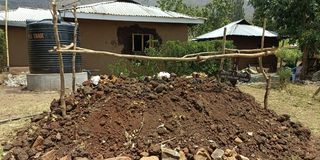Why CS Mvurwa cancelled visit to deadly Nandi mines

The grave of the late Geoffrey Rotich, an employee of the Karebe Mining Company who perished with two others in an explosion inside the tunnel last month. His widow, Caroline Rotich has claimed strangers have been visiting his graveside to perform rituals at night.
What you need to know:
- A Kapsabet Court allowed detectives to continue holding 10 suspects arrested in connection with the deaths of three employees of Karebe Mining Company
- Investigators say tension is still high in the area and that continuing to hold the suspects was for their safety
- Widows of the deceased claimed they had received threats on their lives, and were under pressure to agree to solve the case out of court
Mining Cabinet Secretary Salim Mvurya who was expected to visit Karebe in Nandi county to help reconcile two rival mining groups cancelled the trip at the last minute because tension is still high in the mines, Nation.Africa understands.
The CS was expected to pay the area a visit to address the conflict over mining territories, following turf wars blamed for the death of three gold miners in an underground tunnel accident last month.
It happened as a Kapsabet Court allowed the Directorate of Criminal Investigations (DCI) to continue holding 10 suspects who were arrested in connection with the deaths of the three gold miners, who were employees of Karebe Mining Company in Nandi county.
Suspects' safety
The investigating officers had told the court that tension was still high in the area and that continuing to hold the suspects was for their safety.
The suspects Alfred Magut, Simion Cheruiyot, Henry Ruto, Wilson Tigoi, Philemon Too, Shadrack Milelei, Daniel Kiplagat, Kennedy Kurgat, Zakayo Korir, and Hillary Kipchirchir are yet to be formally charged.
They are suspected to have been behind the underground blast that caused the deaths of the three.
Other gold miners were also injured.
The suspects have not formally been charged in court since their arrest last month soon after the incident, as their files are still at the Directorate of Public Prosecutions headquarters in Nairobi.
Bail application
All 10 suspects had asked the court to release them on bail, promising to attend all court proceedings.
Chief Inspector Christine Rono from the DCI had filed in court affidavits requesting to continue holding the suspects in custody for an additional 10 days, arguing among others, that there was a risk of the suspects being attacked by members of the public.
The officer told the court that she needed more time to analyse exhibits and that more witnesses were still at large.
Mr Rono added that the suspects hailed from the same geographical area as the deceased persons, and were likely to interfere with the investigations, adding that they had been arrested by angry members of the public and rescued by police.
The court was informed that the Director of Public Prosecutions Noordin Haji was yet to present to the prosecution the committal bundle before the suspects are arraigned.
Friday determination
Kapsabet Chief Magistrate Samuel Mokua gave investigating officers two more days, after which a bail application for the 10 suspects will be determined.
The magistrate directed that the suspects be held at the Kapsabet Police station and that he would give further direction on Friday, February 24 on the bail application made by the suspect's lawyer, Mr Charles Sagasi.
Following the January 23 incident, the local community had demanded a team from Nairobi to move in and investigate amid claims that rival miners had caused the incident, in bitter turf wars.
24 questioned
The DCI team led by Director Eliud Lagat summoned 24 people for questioning over the incident.
DCI officers allowed 14 people to go home and detained the 10 suspects after the local community at Chemelil threatened to take the law into their own hands by attacking the arrested suspects, should they be set free.
Widows of the deceased claimed they had received threats on their lives, and were under pressure to agree to solve the case out of court.
Powerful officials in the government have been blamed for protecting the illegal miners and for seeking the case reduced to an inquest, which villagers have vehemently declined.





